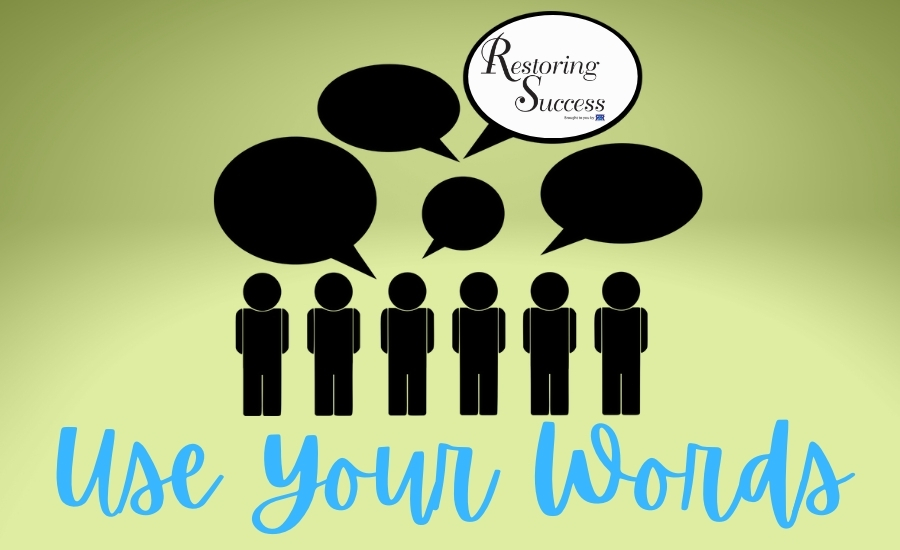As children are learning to speak and communicate, we often say, “use your words.” An important soft skill that, as adults and restoration professionals, we should never stop developing in ourselves and others. The following excerpt is a brief description from childcare.net as to the importance of developing this skill:
Use Your Words
Teaching young children to "use their words" is a well-known educational tool aimed at increasing kids' communication skills and teaching kids how express their feelings rather than resort to physical means (i.e., hitting, biting, scratching, etc.) to resolve conflicts. All daycare staff should be trained in how and when to encourage children to use their words, and at which ages children need help in finding the right words to express their feelings. Teaching kids to use their words is also a developmental strategy in the realm of "emotional intelligence," or "emotional coaching," wherein parents and caregivers teach kids how to name their emotions and learn to deal with setbacks and change. Read the Entire Article Here
The ability to clearly articulate and use the right words is important in our service to others, individual success, and organizational goals. The words we choose and ability to not just communicate but to communicate effectively in an emotionally intelligent manner helps us succeed in our day to day. In restoration, we are often faced with difficult situations and conversations, being equipped to use the “right” words can ultimately impact the outcome. We can teach, coach, learn and constantly improve much like many other skills.
This important skill helps us in our entire life, and these are a few areas to consider in our restoration companies:
- Customer Communications
- Management and Leadership
- General Internal Communications
Scenarios
Scenario 1
A customer wants the equipment pulled early and does not seem to care about the implications.
Response 1: Fine, but you know you will probably get mold!
Response 2: I will respect your wishes; however, I need to advise you that our company cannot deem the materials dry and I will need you to sign a waiver that you understand that there may be secondary damage up to and including microbial growth.
Objective: A response that is respectful to a property owner’s wishes while protecting the company’s potential liability.
Scenario 2
On the first day of meeting a new customer, customer states that Joe in the office said all the work can be done by Friday. Caught off guard, it is not possible that the job is done Friday.
Response 1: Joe is totally disorganized and has no idea when the job can be done! Joe should not have told you that.
Response 2: Let us review the job together. I will touch base with Joe and follow up with you on the schedule.
Objective: Clarify the possible miscommunication and take control of the situation by managing the expectations of the customer so that there is the opportunity to complete their job to their satisfaction. Never should we disparage a coworker or the company. Frustrations with a coworker or supervisor should never be presented with a customer.
Scenario 3
A manager is told they must complete their weekly report. It is the second session addressing the lack of adherence to this company guideline.
Response 1: I give up! I am sick of telling you to do your report.
Response 2: You are either unable or unwilling to do your report. Let us discuss…
Objective: Start a productive conversation that can identify the root cause of the problem and potential solutions. While being firm and clear that the guideline must be adhered to, the opportunity to offer help to the manager may present itself. On the other hand, if the person is simply unwilling to do something that is very important to the organization’s process, the conversation may go in a different direction.
Scenario 4
A customer or business partner makes remarks or outward expressions of prejudice towards members of the team.
Response 1: Huh! Well….Ummm…
Response 2: Our team is a diverse team of restoration professionals and if that is of concern for you, it may be best to work with another company on your project.
Objective: Deliver a clear and professional response that is reflective of your company’s values. Core values are those that are not compromised.
These scenarios are just a few of the many difficult situations and conversations that we can find ourselves in on any given day. Our abilities to handle them by using the “right” words can determine the outcome.
The following are a few tips to consider in developing this skill:
Self-Awareness: Have you ever reflected on a situation or conversation and thought, “I should have said…?” Do not dismiss this thought. See it through and play out the words that may have led you to a better outcome. Next time, in a similar situation, you may have just the right words ready to confidently articulate.
Coaching: In the scenario, where the team member called a co-worker, “totally disorganized” to the customer, the job ended with a bad customer review stating specifically that the company is “disorganized”. You investigate the matter. You learn of the scheduling and communication conversation. This is a great opportunity to talk it through and coach the individual to handle the frustration and conversation differently next time.
Practice and Script: Go through scripts and practice with the team. Utilize the most frequent scenarios like the customer who wants their equipment pulled early to engage the team and equip with the communication tools to succeed. Not only will this help everyone best prepare for the situation that they will likely encounter; it will also help develop their skill in general. It is much easier to think through a situation and find the right words when you do not have the pressure of the moment.
Learn from others: Be observant and constantly learn. You are constantly surrounded by people who at any given point articulate something extremely well. I often make note of others use of words and think, “Wow, that was well said!” One of my favorite’s that I have passed on to others came from my dad, “You are either unable or unwilling to…” referred to above in scenario 3.
Our word choices and ability to articulate them are a valuable skill, something we should constantly develop, and can ultimately determine or influence outcomes. As a side note, our culture and values set the tone. Even if it is a script or words that were practiced, they are always best delivered when they are true, sincere, and from our hearts. The reality is that “using our words” is not always easy as it may sound. Never stop learning how to “use your words.” Best wishes for much Restoring Success.


